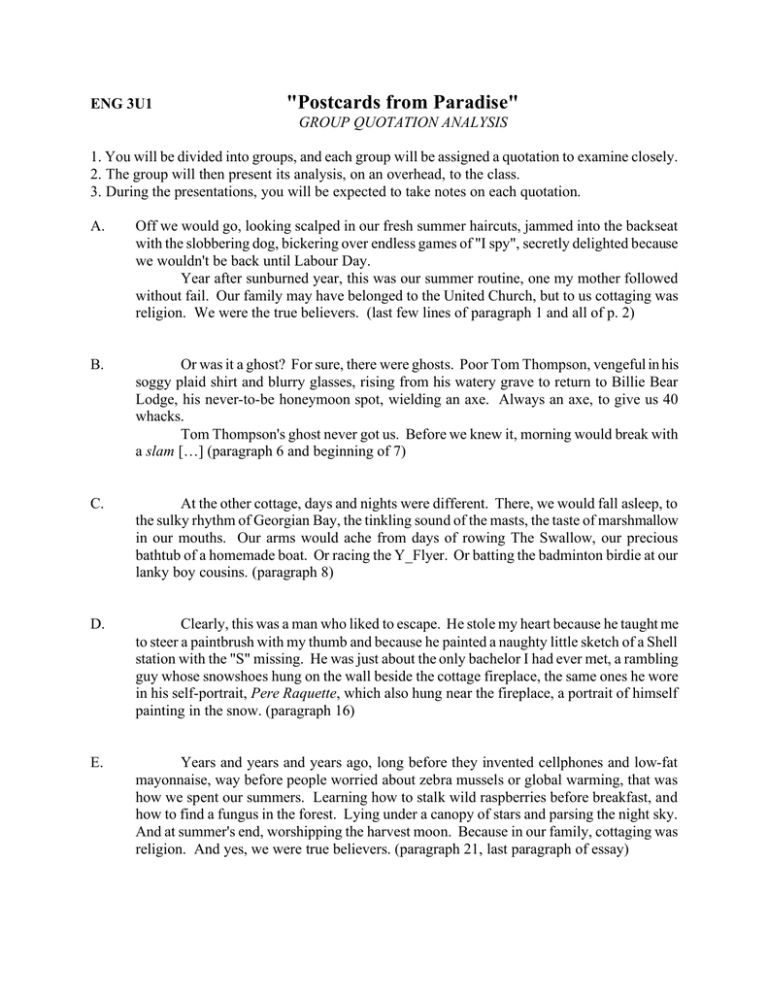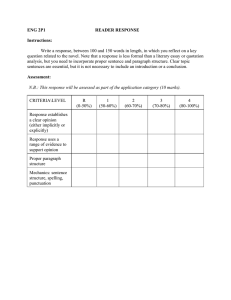"Postcards from Paradise"
advertisement

ENG 3U1 "Postcards from Paradise" GROUP QUOTATION ANALYSIS 1. You will be divided into groups, and each group will be assigned a quotation to examine closely. 2. The group will then present its analysis, on an overhead, to the class. 3. During the presentations, you will be expected to take notes on each quotation. A. Off we would go, looking scalped in our fresh summer haircuts, jammed into the backseat with the slobbering dog, bickering over endless games of "I spy", secretly delighted because we wouldn't be back until Labour Day. Year after sunburned year, this was our summer routine, one my mother followed without fail. Our family may have belonged to the United Church, but to us cottaging was religion. We were the true believers. (last few lines of paragraph 1 and all of p. 2) B. Or was it a ghost? For sure, there were ghosts. Poor Tom Thompson, vengeful in his soggy plaid shirt and blurry glasses, rising from his watery grave to return to Billie Bear Lodge, his never-to-be honeymoon spot, wielding an axe. Always an axe, to give us 40 whacks. Tom Thompson's ghost never got us. Before we knew it, morning would break with a slam […] (paragraph 6 and beginning of 7) C. At the other cottage, days and nights were different. There, we would fall asleep, to the sulky rhythm of Georgian Bay, the tinkling sound of the masts, the taste of marshmallow in our mouths. Our arms would ache from days of rowing The Swallow, our precious bathtub of a homemade boat. Or racing the Y_Flyer. Or batting the badminton birdie at our lanky boy cousins. (paragraph 8) D. Clearly, this was a man who liked to escape. He stole my heart because he taught me to steer a paintbrush with my thumb and because he painted a naughty little sketch of a Shell station with the "S" missing. He was just about the only bachelor I had ever met, a rambling guy whose snowshoes hung on the wall beside the cottage fireplace, the same ones he wore in his self-portrait, Pere Raquette, which also hung near the fireplace, a portrait of himself painting in the snow. (paragraph 16) E. Years and years and years ago, long before they invented cellphones and low-fat mayonnaise, way before people worried about zebra mussels or global warming, that was how we spent our summers. Learning how to stalk wild raspberries before breakfast, and how to find a fungus in the forest. Lying under a canopy of stars and parsing the night sky. And at summer's end, worshipping the harvest moon. Because in our family, cottaging was religion. And yes, we were true believers. (paragraph 21, last paragraph of essay)






